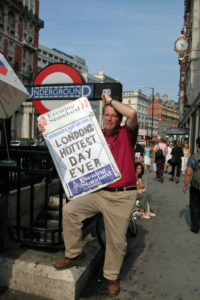I recently found this video of a talk I gave 27 years ago, with my two-minute, circa-1990 take on terrorism. While the eyeglasses may be dated, the message is timeless: Keep things in perspective, don’t turn a small terrorist event into a big one by overreacting, and keep on travelin’. The differences between then and now: More people were being killed by terrorists in the 1980s than in the 2010s; back then, only 8,000 Americans were victims of gun-related homicides annually, while now that figure is closer to 13,000; and today we have sensationalistic, fear-mongering 24/7 commercial news working overtime to keep us on edge.
Earlier today, I was being interviewed on a radio station that needed to cut away for breaking news: In a breathless voice, the announcer reported, “In London, pedestrians have been mowed down by a car and a masked man with a big knife is inside of Parliament. Stand by for more news as it breaks.” With only that information, it was easy to imagine unspeakable carnage unfolding in the House of Commons. The reality — while undoubtedly tragic — is turning out to be much less dramatic, as the police quickly took control of the situation.
There has long been terrorism, and there always will be terrorism. I like to say, “Terrorism is the new normal.” But as this video shows, it’s far from new. And something else that hasn’t changed: If our reaction to these events is exaggerated, we’re still richly rewarding the terrorists for their actions.
In my experience, the most fearful people are those who don’t get out much. But the flipside of fear is understanding — and we gain understanding when we travel. As you watch this vintage clip, please remember: The best way to stay safe is to keep on traveling — and striving to better understand and better fit into our beautiful world.




